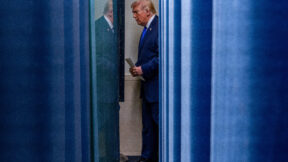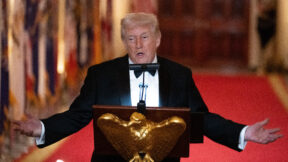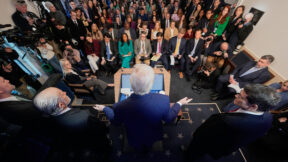Bari Weiss Isn’t Selling Centrist News. She’s Rebuilding Normal News at CBS.
Bari Weiss isn’t just critiquing the failures of legacy media anymore. As the recently appointed editor-in-chief of CBS News, she’s now in a position to rebuild it — and at the Jewish Leadership Conference, she explained exactly how she plans to do it.
Her diagnosis is blunt: every “centrist news” project crashes for the same reason — it treats the absence of disagreement as the remedy for polarization. It sands down charisma, splits every difference, and produces what she calls “tofu oatmeal,” journalism so bland and viewless that no one can taste a perspective, much less trust one.
Her alternative isn’t moderation. It’s transparency. Put people with genuinely different worldviews in the same studio and let them argue with full force, in good faith, on air, where viewers can see how the arguments are made. Actual pluralism, not neutrality theater.
This vision matters because Weiss has the authority to test it. Just last month, CBS News announced it was integrating The Free Press — her heterodox outlet and Substack’s breakout success — into its operations in a deal valued at roughly $150 million. Weiss was named editor-in-chief as part of that move, charged with shaping editorial priorities and driving innovation. She is partnering with CBS News President Tom Cibrowski, whose operational expertise provides institutional continuity. In other words: Weiss brings the editorial vision; Cibrowski ensures the engine keeps running.
And her mandate doesn’t come from CBS alone. The Skydance/Ellison acquisition of Paramount was explicitly framed as transformation, not preservation — and Weiss’s appointment signals that CBS News is part of that overhaul. Hers is a visionary approach, not a custodial one.
Her critique targets something deeper than polarization: fragmentation. Americans now live inside epistemic silos, with no shared civic arena where disagreements unfold in public. The broad middle of the country — the “75 percent” Weiss describes — hasn’t vanished. It’s just unrepresented. These are people who hold layered beliefs, aren’t chronically online, and don’t treat disagreement as personal offense. They believe pluralism is still possible. They just don’t see it practiced anywhere.
The institutions that once convened this middle didn’t lose them overnight. They drifted — toward narrower demographics, narrower incentives, narrower editorial cultures. What we still call “the mainstream” stopped being broadly representative and became something smaller: a subculture with prestige branding.
And into the empty space stepped the outrage operators, the personalities who monetize permanent combat. They didn’t conquer the middle. They moved into the vacuum institutions left behind.
Weiss’s answer is to rebuild the commons by making journalism visible again. Her example: Dana Loesch — former NRA spokesperson — debating Alan Dershowitz on guns. These aren’t carefully selected reps from the center-right and center-left, as she curiously labeled them respectively. They’re people with strong, conflicting convictions who can argue passionately and still in good faith. That’s the point. Weiss isn’t seeking moderation. She’s seeking honesty — disagreement is argued openly instead of being hidden behind the anchor desk.
Another example: a Supreme Court ruling on affirmative action. Standard coverage gives viewers a neutral package and isolated commentary. But the real arguments — over history, precedent, framing, and impact — happen offstage, between editors and correspondents.
Weiss’s proposal is straightforward: move those disagreements onstage. Let viewers see how judgments are formed. Trust doesn’t come from insisting on neutrality. It comes from exposing the reasoning behind the reporting. Transparency doesn’t weaken authority. It rebuilds it.
And this is what Weiss is now tasked with bringing to CBS News. It’s an ambitious project with real obstacles. Legacy newsrooms were built around a unified institutional voice, not around airing internal argument. And the digital incentives remain unchanged: virality still beats substance in every algorithmic ranking. Shifting that culture requires more than rhetoric. It requires power — which Weiss now has.
Skeptics will say legacy outlets have attempted reinvention before and inertia always wins. But Weiss has something most reformers don’t: actual authority inside the building, not a consulting role from the margins. If CBS News becomes a place where viewers can watch good-faith argument play out on air, it will be because she made it so.
This is where her “normalcy” frame becomes clarifying. She’s not trying to reinvent journalism. She’s trying to return it to its basic civic function: disagreements hashed out in the open, adults reasoning publicly, newsrooms acknowledging their perspectives instead of pretending not to have them. It’s not centrism. It’s a realistic model of how democratic discourse is supposed to work.
If this sounds vaguely familiar, maybe because Mediaite founder Dan Abrams coined the term “marginalized moderate majority,” a couple of years ago. Turns out, the 75 percent doesn’t fear disagreement. It lives with it every day — at work, in families, in communities. What it lacks is an institution willing to reflect that reality.
Normal people haven’t disappeared. They’re just unrepresented.
And they’re waiting for a newsroom willing to treat them like they’re still the majority.
This is an opinion piece. The views expressed in this article are those of just the author.
New: The Mediaite One-Sheet "Newsletter of Newsletters"
Your daily summary and analysis of what the many, many media newsletters are saying and reporting. Subscribe now!






Comments
↓ Scroll down for comments ↓